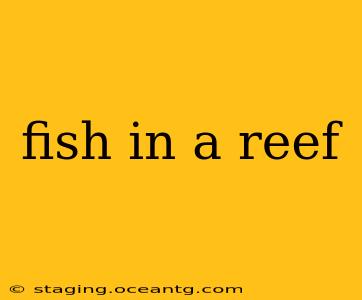Coral reefs, often called the "rainforests of the sea," teem with an astonishing diversity of fish. These vibrant underwater ecosystems support a complex web of life, with fish playing crucial roles as predators, prey, and crucial links in the food chain. From the tiniest goby to the largest grouper, the variety is breathtaking, each species adapted to its specific niche within the reef's intricate structure. This article will delve into the fascinating world of reef fish, exploring their incredible diversity, ecological roles, and the threats they face.
What are the different types of fish found in coral reefs?
Coral reefs support an incredible array of fish species, categorized broadly by their feeding habits and lifestyles. We can find:
- Herbivores: These fish, like parrotfish and surgeonfish, graze on algae, helping to maintain the balance of the reef ecosystem. Their grazing prevents algae from smothering corals.
- Carnivores: Predatory fish like groupers, snappers, and lionfish hunt other fish, crustaceans, and mollusks. They help control populations and maintain the biodiversity of the reef.
- Omnivores: Many reef fish are omnivores, consuming both plants and animals, providing them with flexibility in their diet.
- Planktonivores: Small fish, such as damselfish and cardinalfish, feed on plankton, contributing to the reef's complex food web.
- Detritivores: These fish, such as certain wrasses, feed on dead organic matter, playing a vital role in nutrient cycling within the reef.
How do fish interact with the coral reef ecosystem?
Fish are integral to the health and function of coral reefs. Their interactions are multifaceted:
- Coral health: Herbivorous fish control algae growth, preventing it from overwhelming corals.
- Nutrient cycling: Detritivores break down organic matter, recycling nutrients back into the ecosystem.
- Predator-prey relationships: The predator-prey dynamics among reef fish help regulate populations and maintain biodiversity.
- Symbiotic relationships: Some fish have symbiotic relationships with other organisms, such as cleaner fish that remove parasites from larger fish.
- Reproduction: Many reef fish contribute to the reproductive cycle of corals and other organisms, supporting reef regeneration.
What are the threats to fish in coral reefs?
Unfortunately, the vibrant fish populations of coral reefs are facing significant threats:
- Overfishing: Unsustainable fishing practices deplete fish populations, disrupting the delicate balance of the reef ecosystem.
- Climate change: Rising ocean temperatures cause coral bleaching, leading to habitat loss and impacting fish populations. Ocean acidification further weakens coral structures.
- Pollution: Runoff from land-based sources introduces pollutants into the water, harming both coral and fish.
- Habitat destruction: Coastal development and destructive fishing practices directly destroy coral reef habitats.
- Invasive species: Invasive species, like lionfish, outcompete native fish and disrupt the established food web.
What is the role of fish in maintaining the health of a coral reef?
Fish play a pivotal role in maintaining the health of coral reefs. As highlighted above, their diverse feeding habits contribute to nutrient cycling, algae control, and population regulation. Without this balance, reefs become vulnerable to disease, algal overgrowth, and ecosystem collapse.
How do different types of fish contribute to the biodiversity of a coral reef?
The immense diversity of fish on coral reefs is a direct reflection of the complex habitats and niches within the reef structure. Each species plays a unique role, from the smallest plankton-eating fish to the apex predators. This diversity ensures ecosystem resilience and stability.
What are some examples of fish that are found in coral reefs?
Examples abound! Consider iconic species like the clownfish (anemonefish), brightly colored parrotfish, impressive groupers, agile angelfish, and the venomous lionfish. These are just a few among thousands of species found across different coral reef ecosystems globally.
Conclusion
The fish of coral reefs are a vital component of these incredibly biodiverse ecosystems. Understanding their roles, the threats they face, and the importance of conservation efforts is critical to ensuring the long-term health and survival of these underwater wonders. Protecting these vibrant ecosystems and their inhabitants requires a multifaceted approach, including sustainable fishing practices, climate change mitigation, and pollution reduction. Only through concerted global action can we hope to safeguard these irreplaceable treasures for future generations.
